Intel Corp, IT companies at home in megacity’s new area
( China Daily )
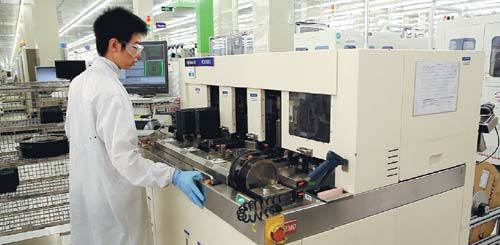 |
|
A technician works in Intel Corp’s factory in Chengdu. [Photo provided to China Daily] |
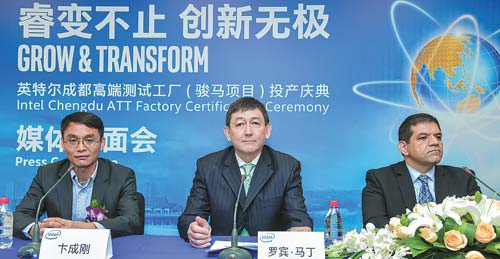 |
|
Intel Corp holds a press conference on Nov 18 to announce its Advanced Test Technology facility in the Chengdu Hi-tech Zone beginning high-volume production. [Photo provided to China Daily] |
Chengdu, a megacity in western China, is drawing investment from around the world, as it becomes more international and more integrated into global industrial chains.
Intel Corp announced on Nov 18 that its Advanced Test Technology facility in the Chengdu Hi-tech Zone had begun highvolume production.
The company set up its Chengdu plant in 2003. The facility was originally designed for preparation, package assembly, and final test operations for a broad base of products.
Intel has continued to invest in the city. Its total investment climbed up to $600 million in 2009. In December 2014, Intel announced plans to invest up to $1.6 billion in the coming 15 years to upgrade its semiconductor plant in Chengdu.
As part of the upgrades, Intel brings its Advanced Test Technology to China for the first time, as a way to enhanced manufacturing flexibility.
“I am very happy to see the Advanced Test Technology ramped up after many years of intensive efforts,” said Ann B. Kelleher, corporate vice-president and general manager of the Technology and Manufacturing Group at Intel.
“It brings advanced innovation to the semiconductor industry and demonstrates our work to develop unprecedented capabilities,” she said.
Kelleher said this also showcases Intel’s support and commitment to China’s future manufacturing master plan, entitled “Made in China 2025”, as well as the go-west campaign.
Robin A. Martin, Intel Corp vice-president and general manager of Assembly Test and Manufacturing, said the Advanced Test Technology facility is a technological breakthrough and a major innovation of Intel’s supply chain, bringing in better quality products, significantly improved flexibility and reduced manufacturing cycle time.
In addition, the technology creates opportunities to reduce manufacturing costs and offer massive customization if needed, he said.
“I am very excited to see this technology is landing and being developed in Chengdu as it is a recognition of the Chengdu team’s consistently solid performance, and of course the supportive local government and community that value Intel as a strategic asset to the city,” he said.
Bian Chenggang, vice-president of the Technology and Manufacturing Group at Intel Corp and general manager of Intel Chengdu, said: “I would like to extend my sincere gratitude to the Chengdu government, who helped Intel Chengdu to successfully transform with its Advanced Test Technology facility, and move up the high-tech value chain.”
He said: “Chengdu has become a major high-tech hub in China and one of Intel’s critical supply chain nodes. Many products produced here will go on to Intel’s global supply chain and significantly transform and grow the industrial ecosystem.”
According to Bian, Intel’s investment throughout the past 10 years has helped Chengdu to become a major high-tech player in the regional economy and in China with signifi cant growth.
“Now, with Intel’s new investment of $1.6 billion for the next 15 years, I do believe it will push the local high-tech industry to the next level that can greatly benefi t local economic growth and development,” he said.
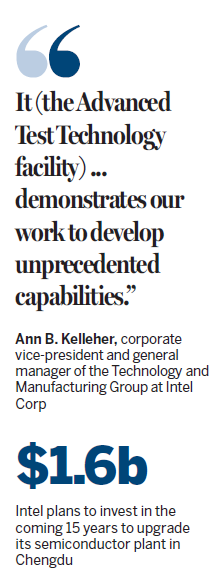
Following Intel, a growing number of IT companies have invested in Chengdu.
In July, Germany-based Siemens AG announced that it would increase its presence in Chengdu by setting up a subsidiary with registered capital of 330 million yuan ($47.8 million).
In November, Siemens signed an agreement worth one billion yuan with BOE Technology Group’s Chengdu subsidiary to help the latter to upgrade its production line according to the standards of the German Industry 4.0 strategy.
Chengdu is known as the fourth pole of China’s IT industry, after Beijing, Shanghai and Guangzhou. Half of the world’s laptop chips are tested and packaged in Chengdu, and two-thirds of all iPads are made in the city. Chengdu High-tech Comprehensive Bonded Zone is home to the manufacturing plant of a number of IT giants, such as Dell, Texas Instruments, Siemens, Lenovo, Foxconn and Molex.
The Chengdu Tianfu Software Park has attracted more than 600 companies, including IBM, GE, Ericsson, Ubisoft, Huawei and Alibaba. Of those, 34 are Fortune Global 500 companies.
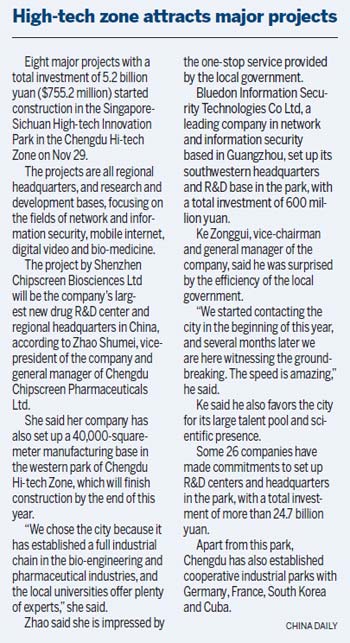
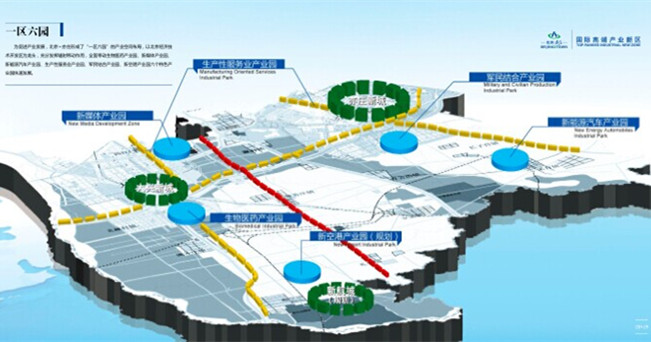 The Area with Six Parks
The Area with Six Parks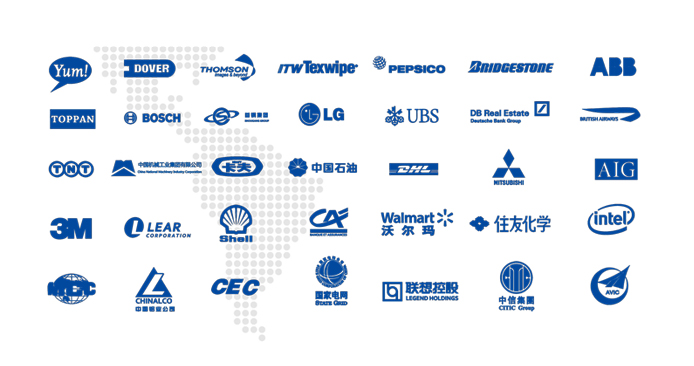 Global Top 500
Global Top 500